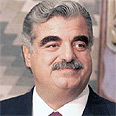
Slain Lebanese PM Rafik Hariri
צילום: איי אף פי
Journalist who blamed Hizbullah 'stands behind report'
Der Spiegel's diplomatic correspondent Erich Follath says he read countless authentic documents while researching story accusing Shiite group of being responsible for former Lebanese PM's murder, verified every single word before it went to print
Erich Follath, the Der Spiegel journalist who reported that Hizbullah was responsible for the 2005 assassination of former Lebanese Prime Minister Rafik Hariri, said Wednesday that he stands behind his report.
The report, published by the German magazine over the weekend, enraged the Shiite group, which adamantly denied any connection with the assassination.
In an interview with London-based Arabic-language al-Sharq al-Awsat newspaper, Follath said that he read countless "authentic documents" while researching the story, and that he "verified every single word before it went to print."
Follath, Der Spiegel's diplomatic correspondent, told the paper that he visited Syria several months ago and interview Syrian President Bashar Assad, although this had nothing to do with the Hariri story.
He further stressed that he was a journalist "loyal to his conscience," and that he was not operating on behalf of any intelligence organization, as those rejecting his conclusions have suggested.
Hizbullah claimed that Der Spiegel was a pro-Israeli magazine funded by a Zionist lobby, and that the article was made to serve Israeli interests, to which Follath replied that he had "criticized Israel numerous times in regards to human rights issues in the occupied territories."
The German reporter said he was not surprised by Hizbullah leader Hassan Nasrallah's onslaught, and that he found it emboldening.
Rafik Hariri was assassinated in early 2005, in what was initially assumed to be a Syrian operation, although no conclusive evidence to that effect was ever found.
The United Nations appointed a special tribunal to investigate the hit, and according to Follath's report, concluded that Hizbullah was responsible.
Follath quoted "sources close to the tribunal" as saying that the case was cracked after investigators "identified eight mobile phones, all of which had been purchased on the same day… and used exclusively for communication among members of the hit team."
The investigators, he said, "referred to these mobile phones as the "first circle of hell."










